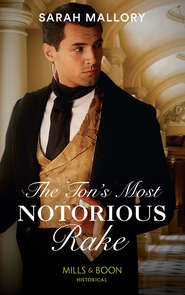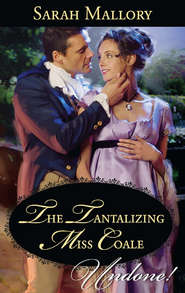По всем вопросам обращайтесь на: info@litportal.ru
(©) 2003-2025.
✖
One Snowy Regency Christmas: A Regency Christmas Carol / Snowbound with the Notorious Rake
Автор
Год написания книги
2019
Настройки чтения
Размер шрифта
Высота строк
Поля
‘But I do not see why you wish to tell me of it. It is no business of mine,’ she said, almost leaning out of the window in an effort to put space between them.
‘On the contrary. I mean to make it your business. I understand that there has traditionally been a gathering of villagers at the house for Christmas. You have been in attendance at it, with Miss Anne Clairemont and her sister.’
‘But that was years ago,’ she admitted. ‘Not since …’ Not since Mary died and the Clairemonts shut up the house at Christmas. But the circumstances were no business of Stratford’s.
‘You and your family will honour me with your attendance this year as well,’ he said. ‘I am short of ladies, and there are likely to be several young bucks who would prefer an eligible young partner to dancing with their sisters.’
‘On our limited acquaintance, you expect me to sit in attendance on your guests? That is rude beyond measure, sir.’
‘Nothing of the kind. I invite you to be one of my guests. There would be no obligation to dance if you did not wish to do so. Though should you meet someone and form an attachment to him it would solve the question of your unmarried state quite nicely. Between your father’s trouble, and the problem you have hinted at with local society, it must be difficult for you to be so removed from the company of equals.’
It was. Though she tried to control it, a wistful longing arose in her at the prospect of a chance to put on her nicest gown and dance. ‘I do not need your help in that situation,’ she said primly. ‘I am quite fine on my own.’
‘So you keep telling me. But I need your help, Miss Lampett,’ he said, his hands open before him. ‘My business negotiations, whether they are improper or no, are at a delicate juncture. I dare not risk your father giving another angry speech while the investors are here to see it. Nor do I wish to call the law down on him with Christmas dinner.’
‘Then I think you would want us quiet at home for the holiday, and not dancing at the manor.’
‘On the contrary. I have seen your father’s interactions with you. When he is concerned about your welfare, all thoughts of violence go quite out of his head. If you told him that you wished to come to my party he would not disrupt it for fear of spoiling your enjoyment.’
‘Even so, I would not trust him for any length of time in the company of strangers.’
‘Then I shall send him a selection of books from the library. Old favourites of mine that are sure to occupy his mind for the duration of the week.’
‘Old favourites of yours?’ she said in surprise. ‘You gave me to understand that you had no time for books.’
‘Not now, perhaps. But I’d read most of the volumes in the Clairemont library long before my arrival here. In the coming year, when the mill is employed, I hope to have some evenings to myself and might read them again.’
‘You said you were a weaver’s son,’ she said, thinking of her father’s recalcitrant students and wondering if she had misunderstood him.
‘I did not say I was clever at the trade. I was a horrible weaver, and no amount of teaching could make me better. I was more interested in books than the loom. When Father did allow me to go to school I taught myself, in whatever way I could manage.’ He smiled bitterly. ‘I fear I was a grave disappointment to him.’
‘But why did you remain involved in the trade? Surely there might have been another occupation more suited to your tastes?’
‘The life I wanted was forever closed to me, for I was not born a gentleman, Miss Lampett. It appeared that, no matter my lack of skill, I was destined to weave. So I redesigned the loom to make it easier for my clumsy fingers to manage. The machines to be used at the factory are of my own invention.’
Somehow she had imagined him purchasing the frames he used with little knowledge of their workings. But there was real passion in him as he talked of cold and unfeeling machines, and an energy that drew her in like a lodestone. It was only with effort that she noticed the fact that there was no mention of anyone other than himself.
‘Is that why the talk of frame-breaking bothers you so? It must be difficult to see your work destroyed.’
He shrugged. ‘Not really. Before coming here, my business was mostly in the supplying of other mills. When their looms were damaged by vandals, I made additional money in the repair and replacing of their machinery. While the production of cloth is a risky business, there can be no surer trade right now than the making of a thing that is useful, and very much in demand, but needs to be purchased multiple times when it is ruined. That business was the source of my wealth. Though your father and his friends might seek to see the end of me, like men have been my making.’
‘You view the misfortune of others as the source of your success?’ she said, amazed at how far removed he was from the people around him.
‘So it has been. But enough of me and my business. Tell me what your response to my offer is likely to be.’
‘It would be most improper for a single lady to accept an invitation from a gentleman if there is no understanding between them,’ she said, wondering what he could be thinking to ask her in this way.
‘Of course.’ He pounded his fist against his leg once, in irritation. Then he gathered himself a little straighter. ‘Please accept my apologies. It was forward of me. I will extend a formal invitation, in writing, for your whole family to join in whatever activities take place. There will be nothing to upset your father, I assure you. There will be dinners, dancing, games. I expect that it will be a very jolly time. If your parents do not wish to come, you must come alone—in the company of Miss Anne Clairemont and her family.’ He gave her a firm look. ‘There will be no trouble on that front. The doors of my house are open to you.’
There was a faint emphasis on the word ‘my’ to remind her that things had changed. She wondered if he would put the situation to the Clairemonts in the same blunt tone. It almost made her pity them.
But, no matter what he did, it would not be as it had once been. The merriment would not touch the community that it bordered. ‘No, thank you,’ she said. ‘It hardly seems appropriate to celebrate when so many people are unhappy.’ They had reached the gate of the cottage again, and she looked longingly in the direction of her home.
‘How very pious of you.’ He had noticed their destination as well, and tapped to signal the driver. ‘It is a lovely day. Let us make another pass of the high street, shall we?’
‘Do you mean to hold me prisoner in this carriage until I agree to your scheme?’
He held his hands up in a symbolic gesture of release. ‘The thought had occurred to me. But I will let you go home to consider this and see if you do not think it a temporary respite from our troubles. Either way, the mill will open in January. Change is coming and there will be no avoiding it. Once it is open, and at least some of the locals are employed in it, we will find them less likely to raise a hand against me. Until then we must find together a way to stall your father from upsetting my plans—or I will take steps that are pleasant to neither of us.’
The carriage drew smoothly to a stop, and when the door opened he went before her, offering his hand to help her to the ground. Then he signalled for a footman to carry her basket to the house and returned to his seat, closing the shiny black door behind him.
CHAPTER SEVEN
WHEN she was through the door of the cottage she saw her father waiting in the front room, arms folded across his chest. Today she did not fear him so much as dread the weight of his displeasure.
‘Well?’ There was so much disappointment in the one word that Barbara glanced behind her, out of the open door and down the road, thinking that the burden of carrying the weight of her loaded basket could not possibly have equalled this.
She turned back, squared her shoulders and explained. ‘Mr Stratford offered me a ride from the shops because the weather was changing.’ She gave a little shake of her cloak to show the patter of icy drops that had hit her in the short walk from the carriage to the house. ‘He was quite insistent. It seemed that I was likely to create more of a scene by refusing than accepting. So I relented.’
‘There was time enough for someone to come from the village and inform me of the fact and be gone again,’ her father said suspiciously. ‘One would think that a man on foot could not best a team of horses in traversing the distance.’
She cleared her throat. ‘Mr Stratford was deep in conversation with me as we neared the house. To continue it, he turned the carriage and we travelled once more around the village.’
‘Thus it became a social drive.’ Her father shook his head. ‘That is a demonstration of the perfidy of the man. It is much like the mill—offered as an olive branch to the people of this community, only so he can snatch it away as they draw near. He took you, just as he took their jobs, and he dangles you like a bauble, just out of reach, and plays with you at his leisure.’
‘Hardly, Father. We talked for but a few moments. The carriage remained on the high street and I sat in the window of it. I am sure that many in the community could see me and know that nothing untoward was happening.’
The argument seemed to have no effect on him, for he went on with increasing anger. ‘The man is the very devil, Barb. I swear. The devil. He is here to ruin the village and all the people in it with his new ideas and his cheap goods. Nothing can come of cheapening the quality of the work, I am sure. It is the veritable road to hell.’
‘And nothing to do with the matter at hand,’ her mother added firmly from behind him. She looked past him at her daughter. ‘You say that you were seen the whole time? The carriage took no side trips, nor left the sight of the high street?’
‘Not at all, Mama.’
‘You could not have waited until the rain had passed? Or hurried home before it?’
‘I did not want to spare the penny for the boy if I did not have to. The basket was heavy. And Mr Stratford would not take no for an answer.’
Her mother nodded. ‘The offer of transport was fortuitous, even if there was an ulterior motive. What did you speak of?’
‘His business.’ And Mary, of course. They had spoken of her. But it was hardly worth mentioning.
‘Then it had nothing to do with you?’
‘Just as I suspected. It was an effort to turn you against me, and the village against us. The man is the devil,’ her father insisted.
‘Enough!’ her mother snapped, ignoring her husband again and turning back to Barbara. ‘We must deal with the more important matter first. And that should be the honour of our only child, which has not been harmed in the least by the trip, whether it was social or practical.’
‘He invited us to the manor for Christmas,’ Barbara added. ‘He suggested that there might be gentlemen there, and dancing.’ She tried to sound matter-of-fact about it, as though it did not matter one way or the other. She did not particularly wish to meet gentlemen. There was one in particular that she might like to know better, but her father was probably right to call him a persuasive devil who was best avoided.











